A Hucknall History
Religious Influences
Society of Friends
Leicestershire born George Fox emerged as the convincing 1647 preacher soon gaining followers forming a Society of Friends
. 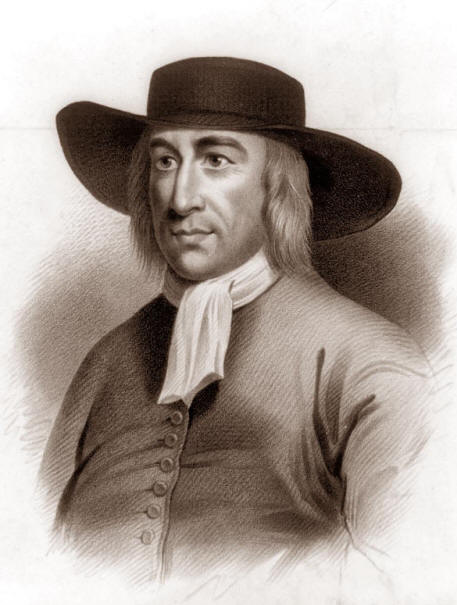
Since the crown broke away from the Papal Roman Catholic Church to head a Church of England, courts could still legally justify severest punishments for any dissenting beliefs. However, there emerged several Separatist Protestant Puritans, all trying to distance themselves from Christian corruption and perceived use of religion to oppress the poor. Separatists generally dismissed need for clergy or formal types of chapel worship. Preferring private prayers or quiet meetings seeking a purer Inner Light
would share widespread popularity becoming collectively known as Seekers
. From them George Fox envisaged and began voicing strongest British leadership, soon convincing those to join his named Society of Friends.
Purification of all Christendom was boldest ambition for his Society claiming independent religious status. Bravely refusing to swear the Oath of Allegiance when dismissing any need for Church worship or paying common tithes supporting that nationalised power, only briefly outlines why ruling powers suppressed an alternative Godly following. But he could not be called blasphemous when that carried a death sentence.
Fox travelled around preaching dissenting beliefs that did result in being jailed, firstly 1649 at Nottingham. Next 1650 sentencing at Derby was when Justice Bennet heard his exhortation they should "tremble at the word of the Lord". Its claimed that magistrates mocking reply would thereafter describe all followers to be commonly known as Quakers. Despite serving an extended year long prison term, from which itself many others would later face a sickened death, George actually continued attracting Friends.
Meeting houses sufficed for arranged Quaker gatherings held between Friends homes. Having soon established a religious society widely inspiring some very influential names, Mansfield would later assert a centralised Nottinghamshire base following alternative Farnsfield meetings. Mansfield town can now proudly boast historic recognition to those former Quaker grounds since covered by the new main bus station. A Skegby meeting house had likewise provided burial grounds, plus the first female Quaker preacher. As well as being similarly jailed in Derby, York and Lincoln, Elizabeth Hooton suffered attacks during ageing travels to include a severe beating from the Vicar of Selston when passing through his parish. Sutton offered another locality claiming past Quaker links.
Huthwaite Meeting House
Huthwaite had vaguely acknowledged some long past resident Quakers. Exposing just a few individuals might eventually realise a remoter 17th century rural population could have begun harbouring a significant number of Friends worthy of historic recognition.
A 1608 Deed of feoffement first covered properties accessing farm lands off Little Lane far predates religious changes. 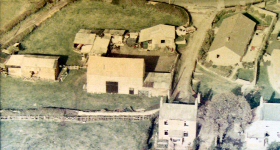 Last owners aerial view over final layout of that old Huthwaite Farm, dates to when Blackwell Road School had still stood top on north side.
Last owners aerial view over final layout of that old Huthwaite Farm, dates to when Blackwell Road School had still stood top on north side.
Significance begins here from year 1665, when owner Thomas Richardson from Sutton-in-Ashfield wrote his dying legacy from prison. Journal entry personally made by George Fox noted how Thomas Richardson ...above Sixty Years of Age, through want of firing and other Necessaries, and lodging upon straw in the Winter Season, was taken sick and died…
Its been further explained how Thomas was attending a Friends meeting in Cambridgeshire when arrested 16th April 1663 and committed to Ely prison. Still refusing to take Oath of Allegiance sent him to Wisbech jail where he died on 13th October 1665.
Thomas had managed writing some visionary papers and letters during confinement. Amongst those were directions for a brother Richard Richardson concerning use of his Hucknall Huthwaite estate. His appointed trustees included an influential John Reckless, George Cockeram, Thomas Sampson and Thomas Hurst. They followed quoted instructions As to ye cottage to be for a meeting house for the people of God called Quakers. And the Land for the reliefe of the poore or necessitous people called Quakers.
Asserting location of a Hucknall Huthwaite meeting house upon farm lands self sufficiently financing Quakers would not escape the attention of Sutton parish clergy, plus law enforcers. Meeting minutes recorded frightening intrusions by blade brandishing bailiffs.
A true relation of the tryalls and sufferings and ---- of the goods of us the people of god called quakers onely for worshipping god in spirit and in truth; which are hereafter related accordinge as they were inflicted now being mett together peacablely in the fear of the Lord at hucknall in our meeting house upon the 16th. of the 2nd. Month 1676 there came in three informers; namely John Smith of Remson and Thomas Sharp of Newarke; the third not known and the said John Smith was deboist in his carridge in our meeting and gave many threatninge words; to one friend hee said hee would thrust his fachin down his throat; and to another that he would throw him down haveinge his fachin drawn and then said he would thrust him into the buttake with many other threatening words and then tooke severall of our names and carried them to Robert Thornton called justiss; and the said Robert Thornton granted them a warrant and fined severall of us; as is hereinafter named.
Hucknall
Francis Clay of Hucknall was fined five shillings for his own offence as they said; and ten pounds for the pretended poverty of a preacher or teacher.
William Clay was fined five shillings for himself and five for his wife and the said William Clay had household goods taken; pewter, brass, wooden ware and other small things to the value of two pounds and they sold them for ten shillings.
Richard Bateman was fined five shillings for his own offence and ten pounds for the pretended poverty of the preacher or speaker and his goods was taken one bedstead and table one coubard and three chaires with other small things that was in his house and the said Richard Bateman being a poor man they took most of the goods in his house to the value of two pounds and they sold them for three shillings six pence for they were forced to sell them for what they could gett as is before recited.
The assicors was forst (forced) to sell great peniworths; because the said Justice gave them order to sell them for what they could gett; if the goods was worth ten pounds they might sell them for thirty shillings if they could gett no more; and that which was worth one shilling they might sell for 8d or 6d or 3d if they could gett no more and because they could not sell ye goods so soon as they would have had them the said Justice fined the assicors five pounds a man.
Richard Bateman was fined five shillings for his own offence and ten pounds for the pretended poverty of the preacher or speaker and his goods was taken one bedstead and table one coubard (cupboard) and three chaires with other small things that was in his house and the said Richard Bateman being a poor man they took most of the goods in his house to the value of two pounds and they sold them for three shillings six pence for they were forced to sell them for what they could gett as is before recited.
Sutton in Ashfield
Elizabeth Clay of Sutton was fined five shillings.
Anthony Tomlinson was fined five shillings for his wife.
Christopher Brandrith was fined five shillings for his own offence and one pound five shillings for the pretended poverty of Richard Binge Robert Grace John Blackburn Joseph Roberts and Sarah Stopard and they took a mare from the said Christopher worth four pounds, which the assicors sold for thirty shillings; thus far in the town and parish of Sutton in Ashfield the assicors names that made the distresses was Samuell Britton Constable; Samuell Chadwin headborow; Thomas and Nicholas Ward called Church wardens.
Skegby
Thomas Cockram for beinge at the same meetinge was fined five shillings for his own offence and ten pounds for the pretended poverty of the house for which the assicors took a yoke of oxen worth ten pounds ten shillings.
George Cockram for being at the same meeting was fined five shillings for which the assicors took two pewter dishes; one flagin; worth Eleven shillings.
John Bullivant the Elder for being at the same meeting was fined five shillings for his own offence; and ten pounds for the pretended poverty of the house; for which fine the assicors took one mare and his stithy and sowmettell pot; a little table and box some nails two chaires two spoons and a dish and severall other small things that was in his shop and the said John Bullivant being a nailer by trade and but low in Estate not keeping house but inhabiting in his shop; the said Robert Thoroton gave order to the assicors to take all hee had; of his Coate if it was of his back; and his hatt if it were of his head; his hammer that hee wrought with if it was out of his hand. And because the assicors could not sell friends goods so soon as they would have had them the said Robt. Thoroton called justice fined the assicors five pounds a man and their goods was seized of for the fine.
John Bullivant the younger for being at the same meting was fined five shillings. The distresses made by Ffranciss Scarcliff constable and Thomas Urdich headborow.
1678 John Langford of Hucknall Huthwaite; because he could not pay tyths, had taken from him as followeth; in 1678 first-wooll and lambe to ye value of;3s.; then two Cart loads of Hay worth 15s.; and after this they brought a felony against him ; to apear at the exchecker all this was done by means of Rob Frankling and John Newton Impropriators ; this may show their unreasonableness ; for they had told him before; that if he would Agree, they would quitt him for 5s. for his Hay.
1683 The 5th. day of the 6th. month 1683 friends being mett together to waite upon god at the House of John Langford in Hucknall in the parish of Sutton in Ashfield; Oliver Tailor of Mansfield Woodhouse came to the meeting and from thence made information before one Justice Neuell of Thorney in the same county who granted him a warrant in which the said John Langford was fined twenty pounds for the House and his goods taken from him. That is 29 sheep worth ten pounds ten shillings Hay and Corn seized in which there was loss of at least two pounds ten shillings.
The assicors names were George Bone, Constable John Shaw Thomas Martin, John Marriott William Swift, thirdboroughs Joseph Chambers George Boore Churchwardens
1697 Taken from John Langford of Hucknall by Samuell Britton Tyth farmer Hay and Corne Value 0-18-0
1678 ffrom John Langford of Hucknall by John Kight Tyth farmer Corne and Hay value 1-2-0
1700 Taken from John Langford of Hucknow by John Kite Tythe farmer Hay and Corne to ye value of 1-2-0
ffrom Wm. Clay by John Kite in Hay and Corn to ye Vallew of 1-4-0
1701 from John Langford of Hucknay hay and Corn wool and Lamb by John Kight tyth farmer of the said town value 1-3-0
from William Clay hay Corn wooll by John Kight value 1-4-0
1702 Taken from Jno. Langford of Hucknall by Jno. Kyte tyth farmer Corne hay and Wooll to ye value of 1-2-0
ffrom Wm. Clay by Jno. Kyte Corne hay and wooll to ye value of 1-3-0
1703 Taken from Jno. Langford of Huknow by Jno. Ceyte tith farmer Hay and Corne to ye Value of 1-6-0
Taken from Willm. Clay of Hucknow by Jno. Ceyte in Lamb Hay and Corne to ye value of 1-10-0
alfo by Samll. Bretting tith farmer Corne to ye value of 0-5-0
1704 Taken from Jno. Langford by Jno. Kyte Tythe farmer of Hucknall Corne Hay and Wooll to ye value of 1-12-0
Taken from Willm. Clay by Jno. Kyte hay Corne Wool and lamb to ye Value of 4-02-00
1705 From John Langford of Hucknall by Jno. Kyte Tyth ffarmer hay and corne and Wooll valued 1-12-0
From Wm. Clay of hucknall by Jno. Kyte Corne Lamb and Wooll 4-2-0
1707 Taken from Will. Clay of Hucknal by Samll. Bretting tythe farmer hay and Corne to ye value of 1-15-0
Taken from Jno. Langford by ye said Samll. Bretting hay to ye value of 0-5-0
1708 Taken from Jno. Langford by Saml. Bretton Tythe farmer Corne hay wooll and lamb to ye Value of 0-15-0
Taken from William Clay by ye said Bretton Corne hay wooll and Lamb to ye Value of 2-2-0
Despite regular fines imposed on those and everyone further attending other raided meeting houses, they kept faithful followers. Above minutes would be typically used when writing letters to the crown listing complaints describing Quaker sufferings
. A 1688 Act did finally put end to most of the unjust penalties by liberally tolerating all various Church of England dissenters. But as later dated fines above show, consistent unwillingness to pay common taxes remained illegal to necessitate lawful recovery in goods.
Historian Bill Clay Dove uncovered more about Huthwaite surname connections relating regular fines later taken from William Clay and John Langford. The latters death still realised impressive wealth under given trade blacksmith. Leaving house and goods fully itemised and valued by John Chatwin and John Wright in 1717 at £41-4s-8d, plus Bonds and Bills owing totalled about £350.
Huthwaite Quakers
Local beliefs had advocated a past Royal Oak Yard rear side the Shoulder of Mutton public house was once owned by Quakers. No evidence yet found supporting they owned that yard, although housing possibly helped support poorer worker friends. Several old cottages share historic interest adding Wesleyanism before recognising Hopkins estate. Earliest suggestive use seems to be housing poorest hand frame stockingers, when that early cottage industry lent descriptive reference to Workhouse Yard. But it is now possible to locate where named Quakers did claim use of land plots and premises elsewhere among Hucknall Huthwaite.
Through a c1795 Act for Enclosure of Commons came potential use of ancient waste forest lands that had long offered descriptive name for Dirty Hucknall. One allocation of said lands received by Richard Leaver stated in trust for the Society called Quakers
. Surveyor J Guantley drew 1892 dated plans covering their Huthwaite estate, holding house, barn, stable, garden and stackyard. An actual copy would be appreciated, but it was simply described incorporated Little Pingle, Croft, plus a detached Timpsons Close.
Pinpointing such archaic addresses proves rather difficult without any mapped reference. After due consideration to other potential areas, 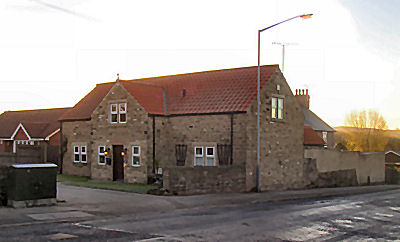 other finds can propose reference revolved around this dwelling, which quite recently opened up site for new bungalows addressing The Paddocks.
other finds can propose reference revolved around this dwelling, which quite recently opened up site for new bungalows addressing The Paddocks.
Quakers were known to have exchanged a plot of land on Commonside, but this location on east side a newly laid 19th century Common Road stands on 1835 map making earliest use of former Dirty Hucknall common lands. Added to which is how this nicely renovated property existed many years before 1876 sinking of the New Hucknall Colliery sited in rear side valley. Founding that coal company was William Muschamp He had purchased mineral rights from Nathan Mellors for £1,450, and a so far unknown Mrs Miller for £1,500. More appropriate purchase from the Society of Friends for £120 could well be for former Dirty Hucknall lands near actual sinking of their huge new colliery.
Industrialisation removed need for a Little Pingle to hold stray farm animals. Reference to a detached Timpson Close though, will finally become relevant identifying longer held land on opposite roadside.
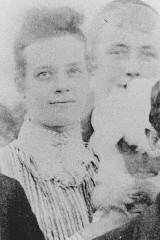
Whereas historical references readily acknowledged local founders of nonconformist Wesleyanism and Methodist chapels, there was little mention naming those continuing far older faith in Quakerism. More prominent Sutton author Dr S T Hall himself offered no further insight through his shy background.
Mrs Mabel Winifred Holland had offered clue revealing an influential family. Seeing that attractive young woman will realise why Miss Wright had previous marriage proposals. Remembered for retelling she'd often turned down one highly respected businessman, is because that extremely disappointed man was landlord of the Peacock Inn, and apparently well known at time being one affluent friend of the society.
Mabel helpfully confirms unexplained reason for 1834 Will of Jeremiah Burrows initially choosing use of a private family burial plot in his nearby Orchard grounds. Burying subsequent family members there is when nonconformists disliked existing parish churchyard interments. But it next begs question which of, and just how many other Peacock landlords had shared religious connections before brewery buy out.
Strictest idealist principles against drinking alcohol, marrying non believing Outsiders
and need to pay tax, therefore seems eroded through time to fully achieve social acceptance of current British Quakers.
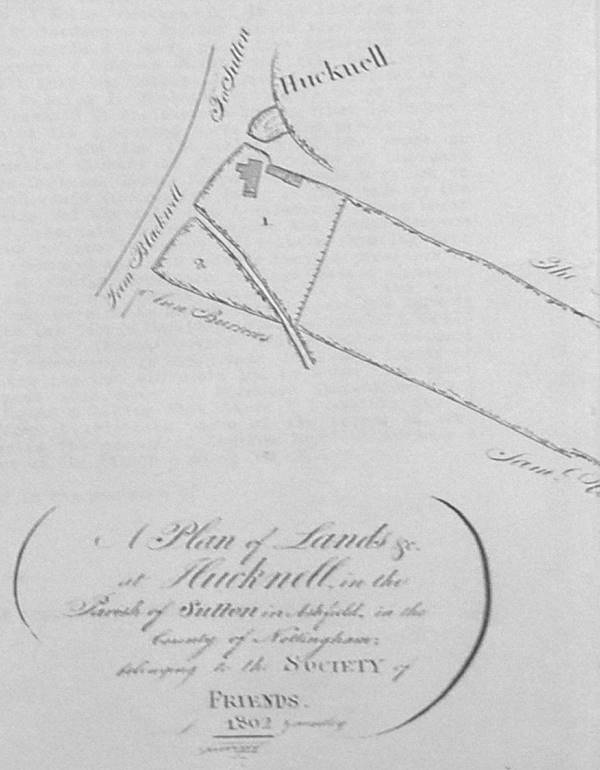
Surveying 1802 Hucknall plots divided by entry into Little Lane included the Huthwaite Meeting House. That cottage stood beyond two centuries, even though 1856 consideration was given demolishing neglected use, described then fallen into decay. Trustees finally agreed decision on 18th April 1882.
George Adlington of Kings Mill sent these agreed accounts for ..pulling down of the meeting house or cottages…
. List reads more like supplies for a new building, but is full receipt totalling cost over four Guineas submitted to and for payment by the Society of Friends Nottinghamshire headquarters.
Thomas Robinson was paid for carting 6 loads at 9d per load
Richard Adlington of Sutton lime works was paid for 6 loads at 8s each
C. Leeson, joiner of Commonside was paid 5s 0d for a pale gate; 1s 6d for ironwork and 2s 6d for gate anging.
Quaker interests had thus been lost here before Thomas Robinson claimed 80 acres from 1881 census revealing move to this simply addressed Bottom End Town farm. His 1850 marriage to Miss Ann Burton of Hucknall Huthwaite raised children who introduce other marital interests, having come off a once known Church Street since siting a facing Church school on Blackwell Road
Society of Friends account papers concerning rent from a short row of small cottages supporting poorer workers was last known handed onto to the late Mr Taylor. They'd stood aside driveway to his replacement bungalow. Rest of the site made way for a large c1990s housing estate. Old entry path into Little Lane has since been transformed into a roadway naming Whitegates Way.
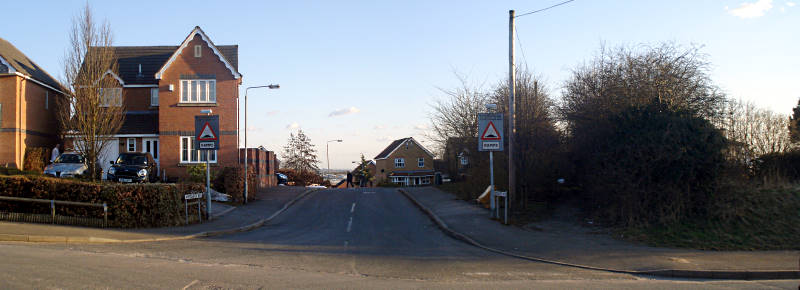
Pulling down a disused meeting house suggested closure for all Huthwaite Quakers. 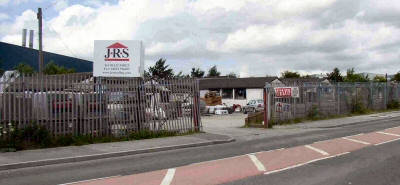 Reintroducing the aforementioned location of Timpson Close aside a newly laid Common Road may now quash that naive understanding.
Reintroducing the aforementioned location of Timpson Close aside a newly laid Common Road may now quash that naive understanding.
Evidence came through a 1953 NCB letter sent to Quakers regarding possible subsidence damage to an Everest Crisp Factory. Popularity of that product is still very much remembered, as was the previous siting of a WW2 Prisoner of War Camp. Clearance of wooden prison camp huts never readily realised land owners might be a final business connection.
Old crisp factory buildings shown in 2003 had been adopted by JRS Roofing. Expanding those 2013 company premises saw entirely new replacement layout witnessing a further established Tippers.
23 Aug 09 by Gary Elliott Updated 30 Nov 21
